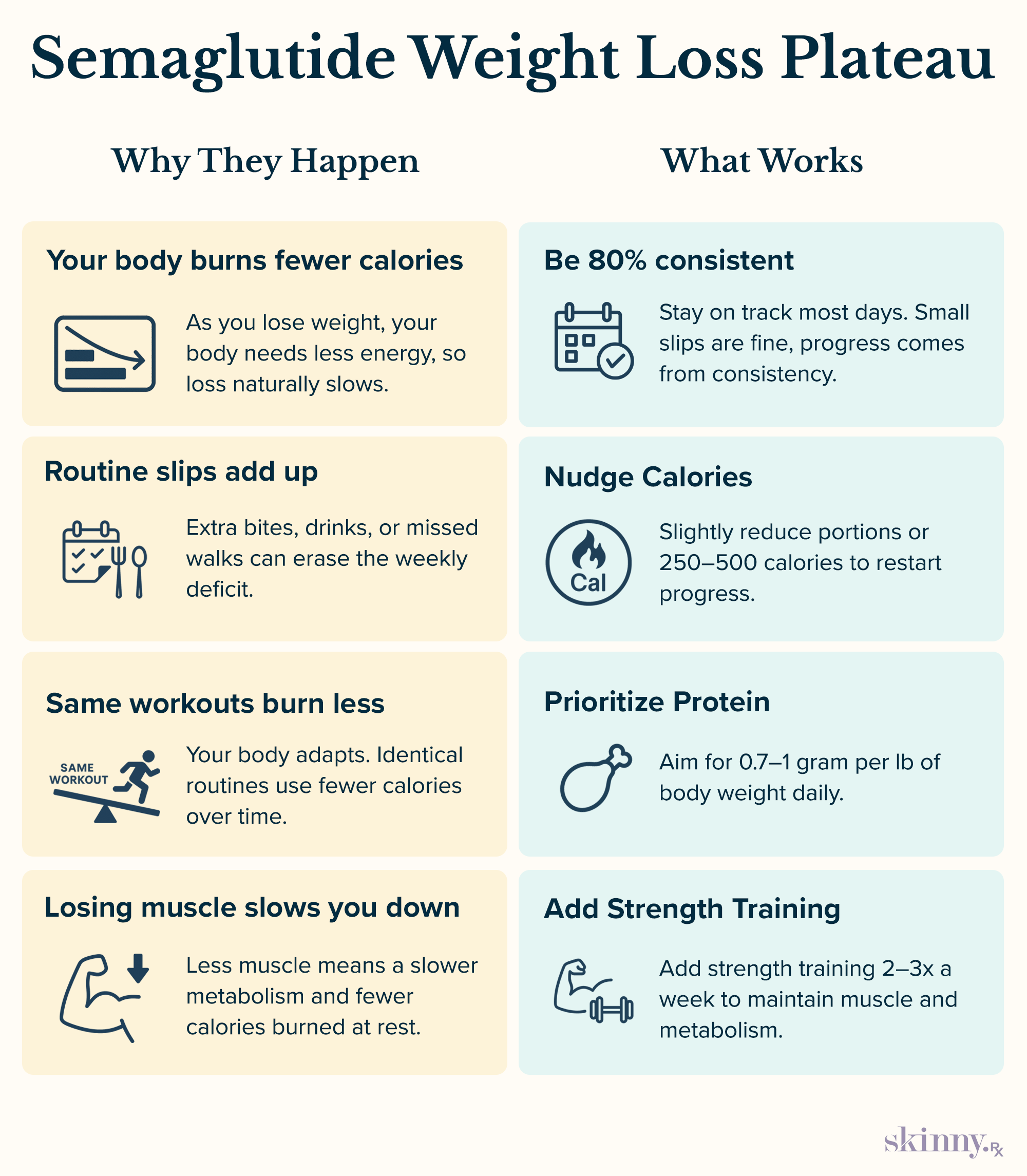
Key Takeaways
- Weight loss plateaus on semaglutide are common and reflect your body adapting to a lower weight, not a loss of medication efficacy.
- As weight decreases, your metabolism and calorie needs drop, which can slow or stop fat loss if intake isn’t adjusted.
- Small lapses in eating, exercise, or sleep patterns can offset your calorie deficit and stall results.
- Maintaining protein intake and incorporating strength training helps preserve muscle and keep metabolism active.
- Modest, consistent changes in calorie intake, routine, or activity are usually enough to restart weight loss safely.
Semaglutide is changing the wellness industry at a breakneck pace due to its efficacy in creating substantial weight loss. But if you’re taking semaglutide and have found your weight loss stalling or plateaued, there are two things you need to know:
- While common, weight loss plateaus on semaglutide don’t mean the medication isn’t right for you.
- There are strategies you can use to break through those plateaus.
We’re going to walk you through the science behind weight loss plateaus, how they happen, and what to do if the scale stops moving while you’re taking Ozempic or Wegovy.
How Semaglutide Works and How You Plateau
Semaglutide is a GLP-1 receptor agonist. In short, it creates weight loss via hormonal signaling, which reduces your appetite, helps you feel full longer, while also delaying gastric emptying and modulating satiety signals in your brain.
By encouraging you to cut back on your food intake, you create a calorie deficit—a gap between the amount of energy your body needs to maintain its current weight, and the amount of energy, as calories from food, you’re taking in.
This gap necessitates that your body turns to existing energy reserves, stored within fat cells, to make up the difference.
However, research shows that, over time, that gap narrows; and your rate of weight loss starts to level out. A 2024 study examining weight loss plateaus observed that, for subjects taking semaglutide, weight loss began to plateau after 15 months.

Expert-Guided, Sustainable Weight Loss
Discover how proven medications such as semaglutide or tirzepatide, combined with expert support, can help you reach lasting weight loss results.
The Science Behind Weight Loss Plateaus
While your rate of weight loss will likely slow over time, it’s important to recognize that the dreaded semaglutide weight loss stall is not necessarily because of the medication losing potency, or your body developing a tolerance.
Multiple physiological and behavioral factors tend to overlap regarding weight loss plateaus and how they occur. Primarily, research tells us that, “An intermittent lack of diet adherence … is a major contributor to the frequently observed early weight-loss plateau.”
But adherence issues may not fully explain why you’re plateauing in weight loss on semaglutide.
Metabolic Adaptation, Explained
GLP-1s don’t physically burn calories for you; they’re mainly appetite regulators. As you accumulate weeks and months in a sustained calorie deficit due to semaglutide’s appetite suppression, metabolic adaptation on GLP-1s may occur—your body becomes more efficient in managing its energy needs.
However, the impact of metabolic adaptation on weight loss plateaus is controversial. The 2014 study from Thomas et al. alleged metabolic adaptation was less influential on plateauing than diet adherence.
Other research corroborates this; in 2022, Martins & colleagues showed that “women with overweight who experienced an average weight loss of 16% … had a metabolic adaptation of approximately ~50kcal/day.” Meaning, while metabolic adaptation does occur, it’s not likely the primary culprit of a stalled diet.
Worth noting: 16% is in the ballpark of the amount of weight most people lose on semaglutide. In plain English, significant weight loss doesn’t necessarily mean your metabolism slows down a great deal.
Calorie Needs Change as You Lose Weight
While an adjustment in metabolic rate of just 50 calories per day may not sound like much, the authors did acknowledge that adaptation “increases the length of time necessary to achieve weight loss goals.”
That’s because the amount of calories you require day-to-day changes as your body becomes lighter. Think of it like gassing up a vehicle; large trucks are less fuel-efficient than compact sedans, since they have more overall mass.
The Role of Energy Compensation
Continuing the analogy, your body becomes more efficient at using the fuel you provide as you lose weight, especially with regular exercise.
This is called energy compensation. Simply put, studies show that as you increase physical activity (as dedicated exercise), your body will encourage you to subtly downregulate caloric expenditure elsewhere.
For example, if you burn 600 calories through a hard cardio workout, energy compensation may subtly influence you to burn fewer calories the rest of the day, in general, around-the-house activity.
Loss of Muscle Mass
Your body composition also matters when it comes to staving off weight loss plateaus. Body composition refers to your personal ratio of metabolically active tissue to, well, everything else.
More directly, it generally means how much muscle mass you have relative to your body fat percentage. Why does this matter? Since muscle is metabolically active tissue, it burns calories just by existing, while fat doesn’t—studies show you’ll burn roughly 6 calories per extra pound of muscle you have.
However, sustained periods of caloric deprivation tend to create atrophy, or the loss of muscle tissue. In 2024, a systematic review, or a study looking at the collective body of research on a given topic, identified that up to 40% of weight loss on semaglutide may come from lean mass, AKA muscle.
When it comes to maintaining body composition, preventing muscle loss on semaglutide is highly important.

Factors Affecting Semaglutide Weight Loss Plateaus
Here are some other tangential factors that may explain why your weight loss efforts on semaglutide have slowed or stalled. Bear in mind that these things can contribute to weight stagnation, but likely aren’t fully to blame.
Sleep, Stress, and Hormones
Your health habits outside of the kitchen influence the results you get while on semaglutide. Take stress; studies tell us that “chronic stress can lead to dietary over-consumption (especially palatable foods), increased visceral adiposity and weight gain.”
Similar effects occur if you have inconsistent or low-quality sleep, especially over the long term. In one study, patients who underwent sleep restriction experienced elevated levels of the hormone ghrelin, which stimulates hunger.
What matters: Do your best to regulate life stressors and maintain a consistent sleep-and-wake schedule, especially if you’re prone to impulsive eating or experience strong cravings when you’re tired.
Hydration and Gut Health
Similarly, studies have also shown that hydration can have a potent effect on your weight loss efforts, even if you’re not on semaglutide. Drinking more water tends to be associated with better weight loss outcomes because it helps with satiety and replaces drinking sugary or calorie-laden beverages.

Real Medicine. Real Results.
Clinician-guided care with semaglutide or tirzepatide, built around you.
How to Break Through Weight Loss Plateaus on Semaglutide
Understanding is only half the battle; now that we know what weight stagnation is and how weight loss plateaus on semaglutide occur, let’s talk about practical solutions on how to break through those plateaus.
First of all: Make sure you’re taking the full therapeutically effective dosage of semaglutide; for example, with Wegovy, that’s 2.4mg weekly. Dosing below the medicine’s therapeutic threshold is a frequent cause of stalled weight loss.
Adherence Is Everything
Semaglutide is a potent appetite suppressant, which can help you curb cravings and stick to a calorie ceiling if you’re prone to overeating. That said, you may have plateaued because of inconsistent adherence to your diet program.
If you eat healthy and in moderation during the week but go wild on weekends, your weekly calorie intake may not work out to your being in a deficit—the same goes for eating well over the course of the day and then binging at night.
Before taking more drastic action, it’s essential to take an honest look at your habits and make sure you’re adhering to a consistent calorie intake at least 80% of the time.
Adjusting Your Nutrition
Generally speaking, a weight loss plateau occurs because your caloric intake and expenditure are equalized; you’re taking in roughly the same amount of energy you burn.
A reliable starting point to breaking through a semaglutide weight loss plateau is getting a handle on your caloric intake (if you haven’t already) and then cutting back a bit.
One pound of fat is approximately worth 3,500 calories—if you reduce your caloric intake by 500 per day, while keeping your physical activity the same, you should lose roughly an additional pound per week. Reduce by 250 per day to drop half a pound, and so on.
The Role of Protein
Protein is one of the three big macronutrients alongside carbohydrates and fat. It’s got four calories per gram, but protein also plays a major role in how easy and sustainable your weight loss efforts are.
Research consistently shows that increasing your protein intake improves satiety and helps stave off the risk of muscle loss which tends to accompany long periods of caloric restriction.
Making protein a larger portion of your caloric intake—without increasing how many calories you’re eating—might help kickstart weight loss after a period of stagnation. Between .7 and 1g/lb is a practical benchmark worth shooting for.
Add Strength Training
All forms of exercise, from walking to weight lifting, are valuable while taking semaglutide for weight loss. To put any extra protein in your diet to good use, you should be hitting the weight room a few times a week if possible.
Strength training isn’t just for building muscle. It helps maintain the muscle you have, improves bodily coordination, reduces injury risk, and much more.
You can think of strength training as an insurance policy while you shed pounds on semaglutide. Moreover, adding two or three weight training workouts to your week will also boost your caloric expenditure a bit.
When To Talk to Your Doctor
Here’s the deal: While frustrating, plateaus are commonplace for anyone on a weight loss journey, whether they’re on semaglutide or not. It does not necessarily mean that the medicine no longer works for you.
That said, your doctor may think it’s advisable to increase your dose in some cases, so it’s a concern worth raising with your physician. And bear in mind—adjustments to your semaglutide dose should only be made under clinical supervision.
But if you’d like to try to get things moving again on your own, you have plenty of holistic options available to bust through that stubborn plateau.
Reaching a plateau doesn’t mean your progress has ended. SkinnyRx offers clinician-guided programs with treatments like semaglutide and tirzepatide, designed to help you safely restart weight loss when your body adapts. Take our short assessment to learn more.


 Medically Reviewed
Medically Reviewed



